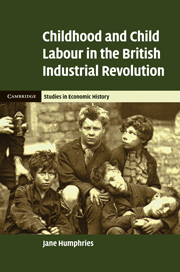5 - Family relationships
Published online by Cambridge University Press: 06 December 2010
Summary
Introduction
Autobiography, for all its defects, is unusual in allowing historians inside the working-class family. It is a poor memoir that does not afford glimpses inside the home or offer some commentary on the meaning of family relationships. Historians have plumbed many reminiscences, including several that feature in this investigation, for what they reveal about family life (Vincent, 1981; Ross, 1993). Since this has been done, and done with skill and elegance, duplication is unnecessary. What does deserve further attention is the way in which family relationships conditioned the availability of children to work and the welfare implications of their labour. This suggests three areas for investigation (each with an associated research question): first, the economic circumstances of the families and their levels of economic need (was poverty the main cause of child labour?); second, altruism (did parents love their children and have their welfare in mind?); and, third, authority (were these families dominated by the husband/father who made the decision when and where a child went to work?).
Earlier chapters have established that while demographically and materially representative, the families of the autobiographers were insecure and often needy. Chief among the circumstances leading to poverty was ‘breadwinner frailty’. Families, even before the era of the classic industrial revolution, had become dependent on a male breadwinner and characterized by a division of labour between mothers and fathers usually associated with a later time and a more developed economy.
- Type
- Chapter
- Information
- Childhood and Child Labour in the British Industrial Revolution , pp. 125 - 150Publisher: Cambridge University PressPrint publication year: 2010

